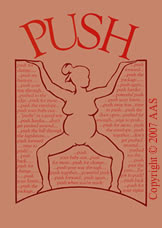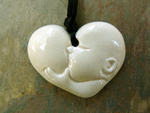 On homebirthdebate.blogspot.com the blogger, a non-practicing obstetrician responds to a post from a women after her numerous responses denying the physical and emotional responses of women (ie., anger, PTSD and depression) to cesarean birth and referring to women as melodramatic.
On homebirthdebate.blogspot.com the blogger, a non-practicing obstetrician responds to a post from a women after her numerous responses denying the physical and emotional responses of women (ie., anger, PTSD and depression) to cesarean birth and referring to women as melodramatic.A woman asks:
"Do you really still believe that stating that a birth was traumatic is nothing but sheer melodrama?"
"Do you really still believe that stating that a birth was traumatic is nothing but sheer melodrama?"
Dr. Amy:
"Yes, I do. Let's consider the many kinds of losses that people can have. What kind of loss does a C-section represent? It's the loss of an experience, that's all. It's not the loss of a life, of a body part, of a loved one, etc. It's the loss of an experience. Elevating it to the same level as these other experiences is melodramatic."
She also stated in another posting, " Pehaps the true figure is that C-sections do NOT increase the risk of neonatal mortality. Perhaps the true figure is that C-sections are life saving on a grand scale."
Perhaps, NOT. "Life saving on a grand scale" is not what the current scientific research indicates. And, cesarean birth is often about the loss of a body part and/or a life. The mother's as well as the baby's.
Perhaps, NOT. "Life saving on a grand scale" is not what the current scientific research indicates. And, cesarean birth is often about the loss of a body part and/or a life. The mother's as well as the baby's.
"The neonatal death rate for Caesarean birth among low-risk women was 1.77 deaths per 1,000 live births. The comparable rate among vaginal births was 0.62. Babies are up to three times more likely to die soon after delivery if their mothers choose a Caesarean section rather than a normal birth, a big American study has shown."http://www.timesonline.co.uk/article/0,,8122-2346344,00.html.
It is one thing to blatantly use cesarean section as a means of controlling one's time and one's liability, it is quite another to disregard the impact of that surgical birth on the mother and the baby. It's called "adding insult to injury." In fact, to me, it's unthinkable. If the woman tells me HER EXPERIENCE of cesearan IS the loss of an experience that I know is a PHYSIOLOGICAL, God-given need in a woman's body, mind, and soul that profoundly affects her connection with her baby, etc, I believe her. The denial of this by physicians and society is what makes one "melodramatic.'" The deep wounding and pain is very real. Why would obstetrics and every aspect of health care, psychology, and religious care NOT believe a woman who gave birth surgically? Why do our social structures not provide the appropriate after care for our mothers and babies?
Call me crazy, but it LOOKS traumatic and dramatic for mother and baby. Research looking at post-partum depression and PTSD after cesearn birth at http://dunamascomm.com/main.php3?primNavIndex=0&mainURL=%2Fpages%2F1891716.

Wouldn't anyone have a physiological and emotional response to this surgery, particularly if it was unnecessary and if they felt manipulated, forced, or cheated? Isn't just the physical aspect enough to warrant acknowledgement? If birth is a naturally occuring way to give birth -- and eons of history and low cesarean rates everywhere else in the world today would indicate it is -- would this not be a hugely defining experience of loss -- to put it so mildly? Is the loss not deeper when anyone, but particularly an obstetrician is unable to be humane and compassionate towards these women? The one who does the wounding to another for whatever reason is still the wounder. Isn't the abuse and the violation (the rape) a woman expresses really due to the lack of compassion and regard -- before, during, and after the surgury (or intervention)? Wouldn't true heroics and life-saving also include compassion and embracing those who experienced birthing in this way?
 "The estimated risk of a woman dying after a cesarean birth is less than one in 2,500 (the risk of death after a vaginal birth is less than one in 10,000)." A woman is four times more likely to die having surgical birth than giving birth vaginally. Induction and epidural use are shown to lead to unnecessary cesarean. (Obstetrics & Gynecology 2005; 105: 974-82).
"The estimated risk of a woman dying after a cesarean birth is less than one in 2,500 (the risk of death after a vaginal birth is less than one in 10,000)." A woman is four times more likely to die having surgical birth than giving birth vaginally. Induction and epidural use are shown to lead to unnecessary cesarean. (Obstetrics & Gynecology 2005; 105: 974-82).
 "The estimated risk of a woman dying after a cesarean birth is less than one in 2,500 (the risk of death after a vaginal birth is less than one in 10,000)." A woman is four times more likely to die having surgical birth than giving birth vaginally. Induction and epidural use are shown to lead to unnecessary cesarean. (Obstetrics & Gynecology 2005; 105: 974-82).
"The estimated risk of a woman dying after a cesarean birth is less than one in 2,500 (the risk of death after a vaginal birth is less than one in 10,000)." A woman is four times more likely to die having surgical birth than giving birth vaginally. Induction and epidural use are shown to lead to unnecessary cesarean. (Obstetrics & Gynecology 2005; 105: 974-82)."The US cesarean section rate is now 30% - the highest ever - and the highest in the world. In the US nearly one of every four babies is delivered by cesection. That is more than 900,000 babies each year."
Aside from an alarmingly high neonatal death rate (first 28 days of life) and infant mortality (first y ear of life)rate in the US (28th of industrialized nations), it stands to reason that cesarean birth is traumatic for the baby that survives such a dangerous experience, even though the former obstetrician denies this. What do you think? The anguish and helplessness on this baby's face is not real? He is being melodramatic? He is not really feeling anything? Magically goes away? How is that?
ear of life)rate in the US (28th of industrialized nations), it stands to reason that cesarean birth is traumatic for the baby that survives such a dangerous experience, even though the former obstetrician denies this. What do you think? The anguish and helplessness on this baby's face is not real? He is being melodramatic? He is not really feeling anything? Magically goes away? How is that?
 ear of life)rate in the US (28th of industrialized nations), it stands to reason that cesarean birth is traumatic for the baby that survives such a dangerous experience, even though the former obstetrician denies this. What do you think? The anguish and helplessness on this baby's face is not real? He is being melodramatic? He is not really feeling anything? Magically goes away? How is that?
ear of life)rate in the US (28th of industrialized nations), it stands to reason that cesarean birth is traumatic for the baby that survives such a dangerous experience, even though the former obstetrician denies this. What do you think? The anguish and helplessness on this baby's face is not real? He is being melodramatic? He is not really feeling anything? Magically goes away? How is that?The truth is that this child IS EXPERIENCING terror and violation, and his brain is recording it. He is likely to struggle his entire life with issues of boundary violations -- perceiving it from others or pushing the boundaries of others, and with issues of trust, frustration, unexplained helplessness, abandonment, and isolation. Thirty percent of our population is being born this way.
A human being born vaginally and placed immediately and gently into his mother's loving arms, hearing her quiet voice, feeling her loving, so ft touch will know in his brain, body, and psyche what it is to be safe, supported, and held with love and dignity. One percent of our population is being born this way.
ft touch will know in his brain, body, and psyche what it is to be safe, supported, and held with love and dignity. One percent of our population is being born this way.
 ft touch will know in his brain, body, and psyche what it is to be safe, supported, and held with love and dignity. One percent of our population is being born this way.
ft touch will know in his brain, body, and psyche what it is to be safe, supported, and held with love and dignity. One percent of our population is being born this way.The baby here was born at home attended by family practice physicians from Home First in Chicagoland. This was twenty minutes after his birth. The reality is these women who give birth at home are likely to be up fixing dinner that day and women who deliver surgically face weeks and months of recovery. Half return to the hospital for care from complications -- again being separated from their baby.
What is this society creating here? What makes women betray other women in this profound experience of bringing our babies into the world?








3 comments:
That woman was me! I must admit that I was shocked but not surprised by the good "doctor's" response. With attitudes like that in the medical community, no wonder the section rates are sky rocketing.
And, no wonder we have the social numbness, denial, and lack of acknowledgement of the total impact on mother and baby, so that we do not have a social will to insure only necessary cesareans are done but also the adequate after care is provided. AND, I DON'T mean ANTI-DEPRESSANTS and "talk therapy" neither of which are effective for PTSD and depression.
Sickly, I was really glad to get to see the photographs of the actual c-section. Having suffered through two of them, a major part of the disturbing nature of the surgery itself was not knowing exactly what was done to me...this actually makes me feel "better" somehow, more justified in how long it took me to recover physically, and how much pain and disability I have endured due to these surgeries. I wish all women could see just what it is all about, and that certain people, who basically poo-poo'ed me after the birth(s), implying that I shouldnt be that sore, or they knew such-and-such lady who popped right out to the stores after her c-section...I wish they could see exactly what was done to me...but then thye will just start in with how I shouldnt have a baby...keep up the excellent blog.
Post a Comment